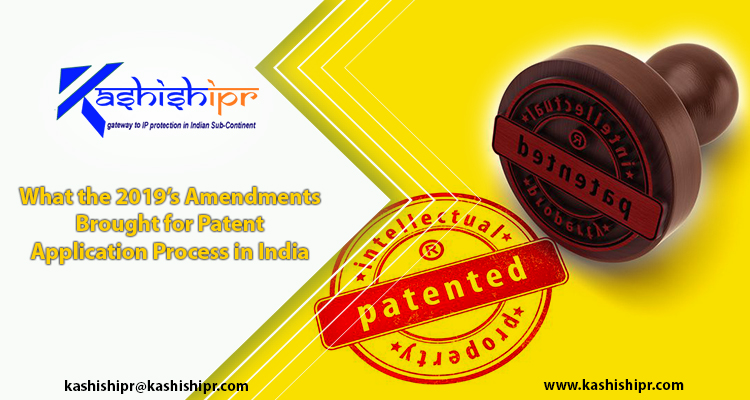What the 2019’s Amendments Brought for Patent Application Process in India?
 Posted On
Posted On
Aiming to encourage and assist the inventors in coming up with more and more useful inventions, the Indian government and authorities taking care of Intellectual Property Law in India have taken a remarkable step. The step, including the following and more reforms in Patent rules, has made the Patent Application Process in India considerably easier.
- Waiving the need for filing originals,
- Removing some fees for international applications,
- Permitting applicants such as women, etc., to apply for expedited examination.
Came into force on September 17 this year, the Patent Amendment Rules 2019 encompass the following changes:
- Original Documents Need to Be Submitted Only Upon Request
In 2016, the Indian Patent Office, commonly known as IPO, had waived the need to submit hard copies of patent blueprints and forms while filing a Patent Application in India. Nevertheless, some specific documents such as the Assignment Deeds, Power of Authority, and verified English translations of Priority and PCT documents still had to be provided in original at the IPO. As per the unamended rules, these documents should reach the Office within 15 days from the date of submission online. Failing to do this will lead to a consideration that the application (document) is not filed at all. Well, this need for submitting the documents in such a short period demands additional efforts and extra costs.
In a welcome move under the amended rules, an applicant can provide all the documents by electronic transmission only as long as they are duly authenticated. As per these rules, the original documents on an urgent basis, i.e., within 15 days of a petition are needed to be submitted only upon the request of IPO.
- Women, Small firms, and Government undertakings Can Apply for Expedited Examination
A few years ago, the Indian government brought the provision of expedited examination for Patent Applications in India. Under that provision, a limited number of applications are allowed to be examined and processed within the expedited period, which is less than twelve (12) months in general.
Furthermore, under the unamended rules, provision of the expedited examination was available only to two categories of applicants:
- Start-ups
- Applicants who select India as an International Preliminary Examining Authority (IPEA) or International Searching Authority (ISA) in their international applications.
With the amended rules, many other groups of applicants can enjoy the expedited examination under specific circumstances.
The new categories of applicants who can apply for the expedited examination are as follows:
- Small entities
- Female applicants, either alone or together with other applicants
- Government entities, such as:
- A Government department;
- An institution substantially or wholly financed by the government;
- A government company as specified in Section 2(45) of the Companies Act, 2013;
- An institution established under a State, Provincial, or Central Act, and is either owned or controlled by the government;
- Applicants who are eligible for processing a patent application compatible with an agreement between IPO and any foreign Patent Office.
- Start-ups Have to File Form 28 with Other Documents Submissions
For Patent Registration in India, start-ups now have to file Form 28 along with the documents supporting their start-up status, each time a form or application is filed at IPO. As far as the fee for start-ups is concerned, filing of documentary evidence will ensure that the applicant is eligible for claiming the start-up status, and thus, relevant reduction in the fee.
- No Transmittal Fee for International Applications
With these 2019’s amendments, the Patent Application Process in India has turned not just easier but cheaper as well. The transmittal fee for filing PCT applications at IPO through the e-filing module has been waived. Earlier, the fee was INR 3200 for common people or start-ups, INR 8000 for small entities, and INR 16,000 for corporates. This waiver is expected to make people file more and more applications designating IPO as the receiving Office.
Besides, the applicants aren’t required to pay fees for the certified copies of priority documents, along with their re-transmission via the WIPO Digital Access System (DAS), as per the amended rules. The amendment has also reduced charges for filing PCT and convention applications.
Conclusion:
These 2019’s amendments are undoubtedly a welcome move by the Indian government towards the nation’s development. These have widened the scope for filing patent applications by motivating women and others to enter the area of research and development, and thus, come up with more inventions. These amendments, as a whole, appear to be an excellent step to promote entrepreneurship, innovation, etc., and thus, enhance the number of patent filings and economic benefits in India.
Ultimately, it will not at all be wrong to say that the amended rules will pave the way for patent prosecution highway in India. For more visit: https://www.kashishipr.com/
Don’t forget to follow us on social media:
Facebook – https://www.facebook.com/kashishipr/
Twitter – https://twitter.com/kashishipr
Linkedin – https://www.linkedin.com/company/kashishipr/
Pinterest – https://www.pinterest.com/kashishipr/
Tumblr – https://kashishipr.tumblr.com/
